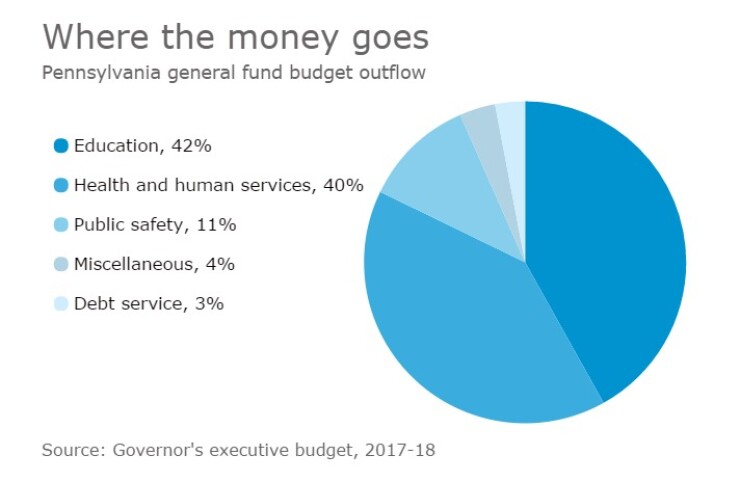

As Pennsylvania lawmakers debate the $32.3 billion fiscal 2018 budget Gov. Tom Wolf
While Pennsylvania has had its own problems approving on-time budgets, while incurring the wrath of bond-rating agencies, Illinois in its 19th month without a permanent spending plan. Fitch Ratings last week dropped Illinois' general obligation bonds to BBB.
"This will be further incentive for the Pennsylvania folks to enact an on-time budget this time," said Alan Schankel, managing director at Janney Capital Markets in Philadelphia.
According to Municipal Market Analytics, Illinois, Pennsylvania and Michigan were among the top five states in terms of negative rating activity in 2016, accounting for nearly 30% of the downgrade actions.
Wolf, a Democrat at odds with a Republican-controlled legislature since taking office in January 2015, revealed a spending plan Tuesday that contains no broad-based tax increases. Up about 2.5% from the $31.5 billion fiscal 2017 plan Wolf signed last July, it emphasizes education, senior services and opioid-abuse prevention.
"The truth is, the people of the commonwealth have elected a Democratic governor and the most Republican legislature in modern history," Wolf told lawmakers during a joint session at the state capitol in Harrisburg. "I think it's safe to say that they don't expect us to agree on everything."
The budget would also set out to rebuild Pennsylvania's rainy-day account from its current $244,000 to almost $500 million by 2022 by reinstating the transfer of 25% of any 2017-18 general fund surplus to the budget stabilization reserve fund.
Wolf proposed what he described as a streamlining of state government designed to save $2 billion and wipe out a deficit that has burdened Pennsylvania the past few years. Measures include shared services such as human resources and information technology, selling surplus state property and consolidating pension funds to cut fees paid to Wall Street.
The legislature's Independent Fiscal Office in late January projected shortfalls of roughly $1.8 billion for fiscal 2018 and up to $3 billion four years thereafter, citing a revenue downturn.
A big loose end is how Wolf and lawmakers can derive the necessary savings.
"It will be interesting to see where the state ends up with this budget as the past few months of revenues have been lower than anticipated," said David Fiorenza, a professor at Villanova School of Business.
S&P Global Ratings and Fitch Ratings assign AA-minus ratings to Pennsylvania GOs with outlooks of negative and stable, respectively. Moody's Investors Service rates them Aa3 with a negative outlook.
The commonwealth's budget imbalance and a statewide unfunded pension liability estimated at roughly $70 billion -- thanks to chronic underfunding -- have triggered five bond-rating downgrades since 2014.
Pennsylvania's fiscal 2016 budget was 16 months late before Wolf let it become law without his signature last March.
In July, Wolf signed a $31.5 billion fiscal 2017 spending plan after lawmakers filled a $1.3 billion gap through a patchwork of tax hikes and revenue assumptions. During the impasse, school districts throughout the state had to borrow more than $1 billion before reimbursement funding came in.
"Pennsylvania school districts saw the brunt of the state's downgrade activity," said MMA. During the budget impasse, the state withheld aid to school districts for several months, diminishing liquidity and credit positions of several districts. "Additionally, the reputation of the state's intercept program was damaged during the budget gridlock."
After Pennsylvania re-emphasized its commitment to the intercept program, Moody's upgraded the program. S&P had withdrawn its rating.
Wolf called for an additional $125 million for kindergarten-through-12th grade classrooms, $75 million to expand early childhood education and nearly $9 million for the state system of higher education.
"My sense is that they'll get a budget done [on time]," Schankel said of Pennsylvania lawmakers. "2016 was very traumatic, certainly for investors."





